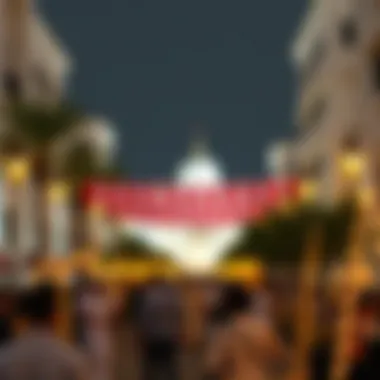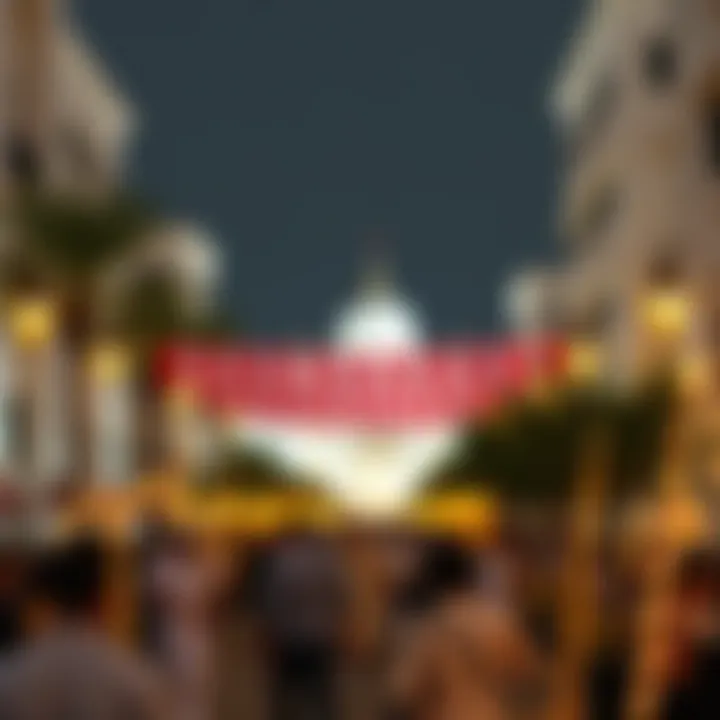Public Holidays in UAE 2023: A Detailed Analysis


Intro
As we step into 2023, the anticipation surrounding public holidays in the United Arab Emirates brings a sense of excitement for residents and expatriates alike. These holidays are not only a break from daily routines; they carry deep cultural and social significances that influence how people engage with their communities and plan various activities. Understanding the implications of these holidays helps individuals and businesses strategize effectively, maximizing opportunities for leisure and commerce alike.
The UAE’s unique blend of traditions and modernity is reflected in its approach to public holidays. Each occasion marks a period of reflection, celebration, and community bonding. From public events and gatherings to special promotions in shops and businesses, the impact of these holidays spans across the social and economic fabric of the nation.
Through this article, we will navigate the nuances of the forthcoming public holidays. We will explore their historical contexts, their relevance in today’s society, as well as potential effects on local markets and investment strategies. Let’s embark on this analytical journey to better decipher the significance of these important dates in the UAE’s calendar.
Prolusion to Public Holidays in the UAE
Understanding public holidays in the UAE goes beyond knowing when to take a day off work. These holidays not only provide a break from daily routines but also serve as a lens through which one can view the rich cultural tapestry and social fabric of the nation. As the UAE gears up for various holidays throughout 2023, it is essential to dissect their significance, impact on social dynamics, and implications for businesses and expatriates residing in the region.
The UAE's public holidays reflect a blend of Islamic traditions, historical events, and secular observances. For many expatriates and residents alike, these holidays offer a glimpse into local customs and community spirit. This article aims to shed light on what to expect during the upcoming holidays, encapsulating their underlying significance.
Cultural Significance of Public Holidays
Public holidays in the UAE serve as vital touchstones for cultural identity and communal unity. They are not just days when the routine comes to a halt; rather, they are celebrations steeped in meaning.
For Emiratis and residents, holidays like Eid Al-Fitr and Eid Al-Adha are times for family gatherings, religious observances, and acts of charity. These celebrations emphasize forgiveness, compassion, and gratitude, encouraging individuals to reconnect with loved ones and their heritage. Additionally, national holidays, such as UAE National Day, foster a sense of pride and collective memory.
While major holidays often draw participation from various communities, it is interesting to note how smaller, regional observances can create local vibrancy. For instance, during the month of Ramadan, communal iftar meals bridge cultural divides, inviting even non-Muslims to partake in the festivities. This open-hearted approach to celebrating holidays helps fortify social links amongst the diverse population.
"Public holidays in the UAE not only illustrate the nation’s beliefs but also the bonds between communities of various backgrounds. These celebrations highlight a unified spirit amidst diversity."
Legal Framework Governing Holidays
The legal structure that outlines public holidays in the UAE is both straightforward and essential for understanding how these days fit within the broader framework of everyday life in the country. The UAE government officially declares public holidays, and the announcement usually comes at the end of the preceding year, giving individuals and businesses time to plan accordingly.
Key factors include:
- Federal Holidays: These are recognized across all emirates, ensuring that whether one resides in Abu Dhabi, Dubai, or Sharjah, the same days of rest apply.
- Eid Holidays: The timing of these holidays is based on the lunar calendar, which means that the exact dates vary yearly. The government provides advance notice, often a few days prior to the start of each Eid, based on lunar sightings.
- National Holidays: Dates like UAE National Day are fixed and widely celebrated by both Emiratis and expatriates. This consistency contributes significantly to the country’s identity.
As a result of this framework, businesses must be cognizant of employee rights to time off, planning operations around these public holidays, and aligning schedules to foster productivity while respecting cultural norms.
In summary, public holidays in the UAE encompass a rich mixture of cultural significance and legal degrees. Understanding these layers is integral for anyone looking to navigate life in the Emirates, be they long-term residents or newcomers. The holidays serve to connect individuals to their communities and reinforce the values that define the UAE.
Public Holidays Calendar for
The Public Holidays Calendar for 2023 serves as a critical reference for residents and expatriates alike in the United Arab Emirates, illustrating the upcoming days of holiday observance and their considerable influence on both social customs and professional engagements. Understanding this calendar is not just a matter of marking days on a wall; it allows individuals and businesses to navigate their schedules effectively, plan vacations, and make informed decisions in their daily lives.
Public holidays in the UAE are often tied to significant cultural and religious events, making them essential parts of the national identity. For example, holidays like Eid Al-Fitr and UAE National Day are celebrated with fervor and hold significant emotional value for many. Beyond the social gatherings and the festive atmosphere, these holidays also present unique opportunities for economic activity, creating a ripple effect across various sectors such as tourism, retail, and real estate.
Federal Holidays
The UAE's Federal Holidays represent a formal structure imposed by the government intended to unify the workforce's observance of national events. These holidays bracket several occasions including religious observances and national pride celebrations, and they allow for a collective period of rest and reflection. Key dates to look out for include:
- New Year’s Day - Celebrated on January 1, it marks the beginning of the year, bringing both residents and expatriates together to reflect on the past year and welcome the new one.
- Eid Al-Fitr - The date of this holiday changes depending on the lunar calendar, signaling the end of Ramadan, a month of fasting. It is a day for community gatherings, prayer, and charity, highlighting the significance of family and social bonds.
- Eid Al-Adha - This festival occurs after the Hajj pilgrimage and is another major religious holiday, celebrated with festivities, meals, and acts of charity.
- UAE National Day - Celebrated on December 2, this holiday is a celebration of the founding of the nation and is marked with parades, fireworks, and community events, embodying national pride.


Being cognizant of these federal holidays allows for better preparation in both personal lives and business operations. When these days arrive, many businesses alter their hours or close altogether, impacting how transactions can be conducted.
Regional Observances
While federal holidays are observed across the UAE, regional observances often showcase the unique cultural diversity that the various emirates embody. These local holidays may not be recognized nationally but hold significant weight within their respective communities. For instance, each emirate might celebrate specific days that reflect their local customs, history, or important local personalities. Some examples include:
- Al Ain's Date Festival - A holiday reflecting the agricultural heritage of the region, particularly focusing on the date palm cultivation, which is economically and culturally significant.
- Sharjah's Cultural Days - These days are dedicated to the arts, showcasing local talent and bringing communities together through exhibitions and performances.
By recognizing regional observances, individuals can engage more deeply with the community, participate in localized celebrations, and appreciate the diverse heritage of the UAE.
In summary, the Public Holidays Calendar for 2023 serves as more than just a setup of dates; it is a framework through which people can better understand social and economic dynamics and their roles within them. As the year unfolds, being aware of these dates not only enhances personal and family experiences but also informs business strategies, ensuring an adaptable and informed approach to life in the UAE.
It's vital for businesses and individuals to anticipate these holidays in order to maximize their potential, both socially and economically.
Details of Key Holidays
Public holidays in the UAE are more than mere days off work; they are pivotal moments that reflect the cultural and social fabric of the nation. An understanding of the key holidays lays the groundwork for recognizing their significance, influences, and the deeper meanings that resonate with both locals and expatriates alike. Holidays serve as an opportunity for rest, reflection, and often, a chance for community engagement. Let’s delve into some pivotal public holidays and unfold their unique significance.
New Year's Day: A Global Perspective
New Year’s Day, celebrated on January 1st, is widely recognized around the globe, marking a fresh start and the year's first day. In the UAE, this holiday carries a particular fervor, infused with local traditions and customs. The celebrations often involve fireworks, public gatherings, and extravagant displays, especially in cities like Dubai and Abu Dhabi.
From a broader standpoint, New Year’s Day reflects the ever-evolving landscape of the UAE's identity. It's symbolic of growth and progress, as many expatriates choose this time to renew their commitment to their careers and lives in the Emirates.
There's also an international aspect to consider. The influx of tourists during this time boosts the economy significantly. Hotels and restaurants usually enjoy packed venues, and many businesses prepare special events and promotions targeted at both residents and visitors. This not only provides joy but also showcases the multicultural aspect of the UAE.
Eid Al-Fitr: Understanding the Observance
Eid Al-Fitr is a significant religious holiday, marking the end of Ramadan, a month of fasting. The exact date varies annually, based on the lunar calendar, making its precise timing something of a community spectacle. As the moon sighting announces the arrival of Eid, excitement fills the air across the UAE.
The holiday stands as a testament to gratitude and generosity. Families come together, offering meals to those less fortunate and sharing in community prayers. The rich aroma of traditional dishes wafts through homes as families prepare feasts to celebrate. Such gatherings foster a sense of unity and belonging, which is incredibly essential in a multicultural society.
For expatriates, Eid represents a unique opportunity to engage with Islamic traditions and partake in local festive activities. Understanding Eid Al-Fitr offers valuable insights into the UAE's cultural landscape; it’s a day where barriers dissolve, and hearts open, welcoming everyone to join in the spirit of joy.
Eid Al-Adha: Historical Context
Eid Al-Adha, often referred to as the "Festival of Sacrifice," commemorates the willingness of Ibrahim to sacrifice his son as an act of obedience to God. This holiday is observed on the 10th day of Dhu al-Hijjah, the last month of the Islamic calendar. Unlike Eid Al-Fitr, its date is not mulled over through moon sightings; its occurrence is predetermined based on religious texts.
The essence of Eid Al-Adha is denoted through acts of sacrifice, charity, and community bonding. Families often gather to perform prayers and share in the slaughter of animals, as a way to emulate Ibrahim’s act of devotion. The division of meat into three parts — one for family, one for friends, and one for those in need — illustrates the holiday's focus on compassion.
For expatriates, participating in these activities can deepen their understanding of the values that shape Emirati culture. Eid Al-Adha's rich historical undertones resonate well with those looking to engage meaningfully within the community.
UAE National Day: Celebrating Unity
UAE National Day, observed on December 2nd, marks the union of the seven emirates and the establishment of the country in 1971. It is a day overflowing with pride, encapsulating shared history and cultural legacy. Celebrations range from parades and firework displays to family gatherings and community events.
This holiday encapsulates the spirit of unity that is integral to UAE’s identity. As citizens and residents alike come together, the street festivals and activities signpost a general sense of belonging that permeates society.


In addition, businesses make concerted efforts to participate in these celebrations, providing promotions that resonate with the sentiments of togetherness and love for the nation. The vibrancy of UAE National Day plays a pivotal role in reinforcing national identity while respecting the rich tapestry of cultures represented in the Emirates.
Economic Impact of Public Holidays
Public holidays serve as more than just days off work; they have a measurable economic impact that can be profound and far-reaching. In the UAE, where both residents and expatriates thrive within a dynamic economic landscape, public holidays offer unique opportunities and challenges. Understanding these impacts can enable investors, businesses, and individuals to make better decisions that leverage holiday dynamics.
The planning and scheduling of public holidays can influence various sectors in the economy, shaping everything from consumer behavior to investment patterns. This effect is especially crucial in a rapidly evolving urban environment like the UAE, where cultural considerations marry with economic imperatives.
Influence on the Real Estate Market
Public holidays in the UAE can be particularly noteworthy for the real estate market. During these times, there's often a surge in activity as both locals and expatriates engage in property transactions. This uptick might stem from the fact that people tend to utilize long weekends to explore potential new living spaces or investment opportunities.
Many developers and real estate agents take advantage of these holidays to conduct open houses and promotional events. They understand that people are more likely to attend these events during their time off, effectively allowing for face-to-face engagement. Additionally, government initiatives during holidays, such as favorable mortgage schemes or incentives for first-time buyers, further fuel this activity. The spike in foot traffic can be beneficial not just for residential real estate but also for commercial properties, as businesses might be looking to expand or invest in new locations at this time.
The correlation between public holidays and the real estate market’s performance is essential for investments. It can dictate pricing strategies and service demand within the sector.
However, it is important to note that this increased activity can lead to market saturation in some areas. Investors need to stay vigilant about market conditions, understanding when trends are favorable for buying versus when it’s wiser to hold off.
Tourism and Public Holidays
Tourism is another sector significantly influenced by public holidays in the UAE. With many holidays aligning with school breaks and travel seasons, there’s often a marked increase in both domestic and international travel. This is particularly true during events like Eid Al-Fitr and National Day, when locals and expatriates alike seek to travel, either out of the country or to popular domestic attractions.
Hotels, restaurants, and entertainment venues often see a surge in bookings around these times. In fact, the holiday season can account for a considerable portion of annual revenue for establishments, necessitating adequate staffing and supply management to meet increased demand.
For businesses in the tourism sector, targeted marketing during public holidays can yield high returns. Promotions that highlight festive events or unique experiences can attract a larger audience looking for ways to celebrate these occasions.
On the flip side, local attractions and services can become overcrowded, which may negatively impact visitor experience. Thus, while tourism can bolster economic activity, careful planning is crucial to ensure that visitors receive the quality of service that the UAE is known for.
Investors in this field should always consider the downstream effects of holidays on tourism patterns, adjusting strategies as necessary to maximize potential gains.
Planning Around Public Holidays
When holidays roll around in the UAE, the air buzzes with excitement, but it also brings a fair share of planning challenges. Understanding how to navigate these holidays can make a world of difference for residents and expatriates alike. Having a clear plan helps one to manage time effectively, enabling both productivity and enjoyable experiences during these festive periods.
Travel Considerations for Residents
For residents in the UAE, public holidays are often seen not only as a chance to unwind but also as an opportunity to travel. With numerous long weekends peppered throughout the year, many take advantage of this time to explore both local and regional destinations.
- Booked in Advance: Early reservations can save both time and money. Accommodations tend to fill up faster during these periods, and prices can soar. By planning ahead, one can secure better rates and avoid last-minute inconveniences.
- Road Traffic: Holidays in the UAE often mean packed roads as many families opt for road trips. It is advisable to avoid peak travel times and to plan for longer travel durations due to increased traffic.
- Flight Schedules: International travel becomes a hot trend during public holidays. Keep an eye on flight schedules and availability, as airlines often put on additional flights to cater to the increase in demand. Consider flexible travel dates to take advantage of lower fares and quieter airports.
- Cultural Sensitivity: When traveling within the region or to nearby countries, it’s essential to be aware of local customs and regulations, especially during religious holidays. Being informed shows respect and enriches your travel experience.
Traveling during public holidays has its perks: beautiful weather, cultural festivals, and often lower prices on activities. Planning accordingly ensures that you enjoy these advantages without unnecessary hiccups.
Business Operations During Holidays
From the business perspective, public holidays can lead to both opportunities and challenges. Companies need to adapt their operations to ensure efficiency while also catering to the needs of their employees and clients.
- Employee Management: Before the holidays, organizations should clarify policies about leave and working hours. This transparency aids in workforce planning, ensuring that projects continue running smoothly.
- Client Interaction: Businesses should plan for potential communication lags that can occur due to holiday breaks. Informing clients about holiday schedules and possible delays in response times is vital. This not only sets expectations but also strengthens professional relationships.
- Operational Adjustments: Adjusting work schedules to accommodate holiday-induced closures is common practice. Some businesses may choose to maintain a skeleton staff to manage critical functions, which can ensure continuity while others enjoy time off.
- Revenue Fluctuations: Holidays can mean a spike in business for some sectors, especially tourism, hospitality, and retail. Recognizing these trends allows companies to optimize staffing and inventory management to capture the seasonal influx of customers.
- Marketing Opportunities: Public holidays present a perfect backdrop for promotional activities. Special campaigns tied to these dates can draw in customers looking for offers that enhance their holiday experience.


"Effective planning around public holidays can turn potential disruptions into opportunities for growth and engagement."
For further insights, consider visiting UAE Government and Wikipedia - Public Holidays for updated information and resources.
Public Reactions and Celebrations
Public holidays in the UAE offer a unique insight into the cultural and social fabric of the nation. Understanding public reactions and the ways in which citizens and residents celebrate these occasions helps to highlight the diverse nature of the UAE. These holidays are more than just days off work; they represent communal pride, cultural identity, and opportunities for gathering, reflection, and enjoyment.
Community Engagement during Holidays
Community engagement is at the heart of holiday celebrations in the UAE. Each public holiday acts as a canvas for showcasing local traditions and shared values, allowing people from various backgrounds to come together. Think about how Eid, for instance, involves not just personal family gatherings, but also communal prayers, festive meals, and charitable activities. The sense of unity and collective joy during these occasions fosters a stronger social bond among Emiratis and expatriates alike.
Activities such as festivals, concerts, and public exhibitions further bolster engagement. The Dubai Shopping Festival, aligning with public holidays, draws in residents and tourists alike, boosting local businesses. Spontaneous street events often pop up, where people share food, music, and stories under twinkling lights. It can seem quite lively—like a fabric woven of many colors, with each thread meaningful.
Contributing to the celebration of public holidays, the local government encourages initiatives that promote cultural awareness and provide platforms for local artists and businesses. This not only enriches the holiday experience but also empowers the community by showcasing local talents and fostering entrepreneurship.
Challenges of Public Celebrations
While the joy surrounding public holidays is palpable, challenges are also part of the equation. The sheer volume of people eager to participate in celebrations can lead to congestion, particularly in larger cities. For instance, during Eid celebrations, prayer grounds can become quite packed, and roadways may experience heavy traffic. Such situations can lead to frustrations and logistical nightmares for both residents and law enforcement.
Moreover, balancing traditional customs with modern demands often poses challenges. Some expatriates might find themselves unsure how to navigate local practices, leading to a sense of alienation or misunderstanding. Public discussions on social media sometimes reveal these sentiments, where individuals express their feelings about adapting to local cultures. Thus, striking a balance becomes essential; it’s about respecting traditions while ensuring inclusivity.
In the midst of all, it’s crucial for everyone to recognize that these holidays serve as a reminder of shared humanity, allowing us to connect beyond differences.
As the UAE continues to grow as a melting pot of cultures, the focus will be on enhancing community engagement while addressing the hurdles that come with it. Encouraging open dialogue and inclusivity during such celebrations can go a long way toward fostering understanding among diverse groups. The blend of rich tradition with modern elements can create a more harmonious environment for both locals and visitors.
Epilogue
The conclusion serves as a pivotal juncture in understanding the upcoming public holidays in the UAE for 2023. It’s not merely a summation; it’s where insights intertwine, painting a fuller picture of their significance in both social and economic landscapes.
Public holidays in the UAE resonate on multiple levels. They act not just as days off work but as moments when communities come together, imbued with traditions and local customs. The feeling in the air during these days — especially during Eid Al-Fitr and National Day — is palpable, fostering a sense of unity that is deeply valued in Emirati culture. This societal importance cannot be overstated. It disrupts the routine of everyday life in a positive way, encouraging people to rejoice, to familiarize themselves with their heritage amidst rapid modernization, and to share experiences with friends and family.
From an economic perspective, holidays influence various sectors, including tourism, retail, and hospitality. Businesses often see a spike in activity during these periods, making it vital for investors and stakeholders to plan strategically around these dates. For instance, knowing when people travel or spend more can guide investment decisions, leading to greater returns. The ripple effects stretch from large corporations down to small local enterprises, making these holidays crucial not only for leisure but also for economic dynamism.
"Understanding public holidays enables businesses and residents alike to harmonize their schedules, maximizing both enjoyment and productivity."
In summary, public holidays in the UAE offer much more than a break from routine. They catalyze social bonds, stimulate economic activity, and offer reflections on cultural identity, making it imperative for residents and business owners to engage actively with these significant days. As we look towards the future, it’s clear that the role of public holidays will continue evolving, shaped by both tradition and contemporary influences.
Reflection on Public Holidays' Role
Public holidays are integral to the social fabric of the UAE. They encapsulate the essence of local culture and values, bridging gaps between generations while also accommodating the multicultural populace. Each holiday, steeped in history and meaning, provides opportunities for community bonding and cultural exchange. These days present chances to reflect on shared experiences, forging stronger ties among residents and expatriates alike.
Moreover, public holidays serve as checkpoints to assess how far society has come. They often stir conversations around progression and identity, linking the past with the present. When Emiratis commemorate their National Day, it’s not just about celebrating a country’s formation; it’s a collective acknowledgment of the strides taken toward prosperity and international status. This duality of remembrance and celebration is prevalent in most holidays.
Future Prospects for Upcoming Holidays
As we gaze into the crystal ball of future public holidays, there’s plenty to anticipate. With the recent moves towards making the UAE a global hub for events and tourism, one can foresee public holidays becoming even more pivotal. It’s likely that these days will evolve to incorporate new festivities that reflect the changing demographics and interests of the population.
The advent of digital technologies can also reshape how holidays are celebrated. Virtual platforms may enhance community interaction, allowing for more inclusive celebrations that cater to the diverse expatriate community. Additionally, an increase in local traditions being recognized alongside global holidays is plausible, enriching the calendar with unique observances that capture the country's evolving narrative.
Investors and business owners should keep an eye on these shifts, as new consumer trends and cultural dynamics will emerge from them. Plans for business operations, community events, and marketing strategies during public holidays will need continual adjustments to stay relevant and impactful.
In summary, public holidays hold a mirror to the UAE’s evolving character. Understanding their role and trajectory aids in better planning for all stakeholders involved, ensuring both cultural respect and economic vitality.







